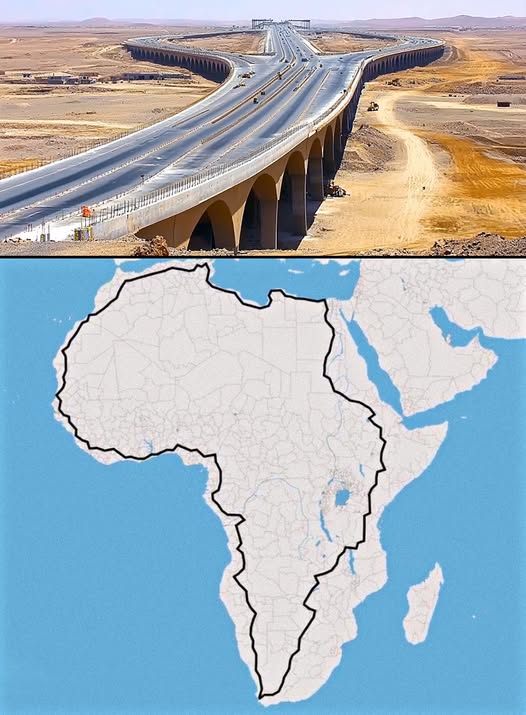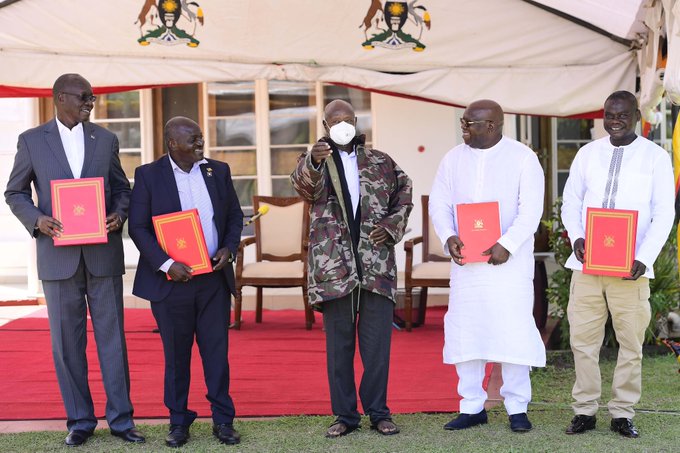In a landmark move aimed at transforming regional trade and integration, Uganda, the Central African Republic (CAR), and South Sudan have agreed to jointly construct a 1,100-kilometre trade road network connecting the three countries. The announcement came during a high-level Tripartite meeting convened by Ugandan President Yoweri Kaguta Museveni at Fort Portal State Lodge on May 16-17, 2025, with delegations from South Sudan and CAR in attendance.
A Visionary Infrastructure Project
The ambitious road project is designed to link Uganda’s capital, Kampala, through South Sudan, and onward to the Central African Republic, creating a continuous transport corridor that will unlock vast economic potential in a region historically constrained by poor infrastructure and limited connectivity. Key routes include the Kampala–Karuma–Nimule–Juba–Kaya–Yeyi corridor connecting Uganda and South Sudan, and the Juba–Mundri–Yambio–Yubo–Ezo–Bambouti–Obo–Sibuti corridor linking South Sudan to CAR.
President Museveni described the initiative as “transformative,” emphasizing its potential to enhance infrastructure, security, and aviation connectivity within the region. The project is expected to dismantle longstanding barriers to trade and mobility, fostering economic growth and regional stability.
Phased Implementation and Technical Coordination
The construction will be executed in phases. Phase I focuses on urgent roadworks, including grading gravel roads and repairing critical bridges to improve immediate connectivity. Phase II involves upgrading these roads to tarmac and rehabilitating existing paved roads to establish a sustainable trade corridor.
To ensure effective coordination, a Tripartite Technical Committee (TTC) has been established. Comprising officials from the ministries of Transport, Infrastructure, Defence, Foreign Affairs, and Internal Affairs from the three countries, the TTC will oversee joint inspections, finalize road alignments, conduct feasibility studies, and develop a comprehensive implementation framework.
Economic and Security Implications
This infrastructure project is poised to significantly boost regional trade volumes. Current trade between Uganda and South Sudan stood at $180 million in 2022, while Uganda-CAR trade was valued at $10 million, and South Sudan-CAR trade at $5 million. Experts anticipate these figures will grow substantially following the road’s completion.
South Sudan’s underdeveloped road network, with only 300 km of sealed roads, has long hindered trade and security. The new road will improve access to markets, reduce transportation costs, and enhance security cooperation among the three nations. South Sudan’s Minister for Roads and Bridges, Hon. Simon Mijok Mijak, highlighted the project’s potential to improve economic integration and security.
Aviation Connectivity and Diplomatic Progress
Alongside the road project, Uganda and CAR signed a Bilateral Air Service Agreement (BASA) and a Memorandum of Understanding to operationalize it. This will enable Uganda Airlines to commence flights to CAR, further enhancing regional connectivity and reducing travel times.
The meeting underscored the visionary leadership of the heads of state-President Museveni of Uganda, President Faustin-Archange Touadéra of CAR, and President Salva Kiir Mayardit of South Sudan-in addressing infrastructure bottlenecks and security challenges that have long impeded regional integration.

The route will pass through South Africa, Kenya, Uganda, Nigeria, Cameroon, Algeria, Egypt, Libya, Senegal, Chad, Djibouti, Ethiopia, Sudan, Botswana, Angola, Zambia, Namibia, Zimbabwe, Mozambique, Tanzania, the Central African Republic, and the Democratic Republic of Congo.
This network symbolizes Africa’s commitment to progress and enhanced interconnectivity.
A Step Toward Regional Integration
This joint infrastructure initiative aligns with the African Union’s agenda for continental development under the African Continental Free Trade Area (AfCFTA), which prioritizes interconnectivity as a key pillar of economic transformation. By improving transport and trade corridors, Uganda, South Sudan, and CAR are taking concrete steps toward deeper regional integration, economic growth, and enhanced diplomatic relations.
The project’s success will depend on continued political will, effective coordination, and mobilization of funding from development partners. The next Tripartite meeting will be scheduled following the TTC’s inspection and planning activities, signaling ongoing commitment to this transformative vision.

